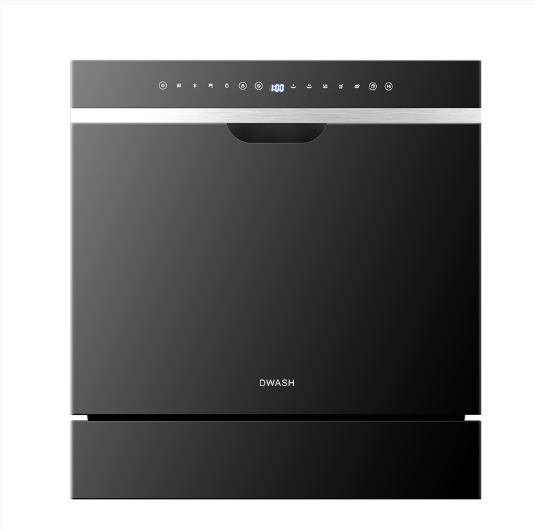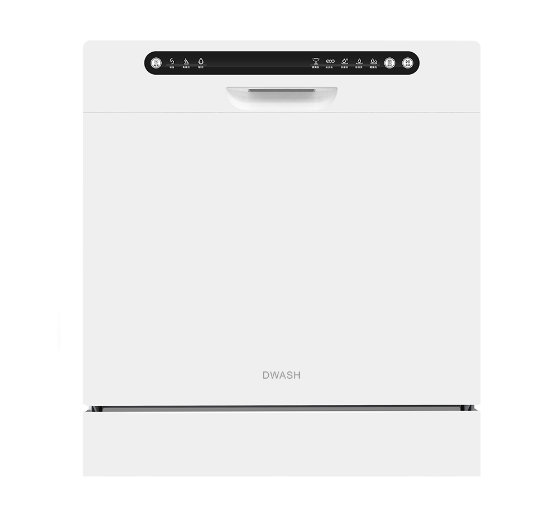-
Call Us Now
+8613824524521 -
Email us
willing.guo@dwash.cn
Built-In VS Free-Standing Dishwashers: What Are Their Differences
When shopping for a dishwasher, one of the primary decisions you'll need to make is whether to go for a built-in or free-standing model.
Both options have their advantages and disadvantages, and understanding the key differences can help you make an informed choice that suits your kitchen and lifestyle.
In this article, we will delve into the distinctions between built-in and free-standing dishwashers, allowing you to make the best decision for your home.
Both options have their advantages and disadvantages, and understanding the key differences can help you make an informed choice that suits your kitchen and lifestyle.
In this article, we will delve into the distinctions between built-in and free-standing dishwashers, allowing you to make the best decision for your home.
What are Built-In Dishwashers?
Built-in dishwashers, also known as integrated or under-counter dishwashers, are designed to be installed beneath your kitchen countertop. They are seamlessly integrated into your kitchen's cabinetry, providing a sleek and streamlined appearance. Here are some key features and advantages of built-in dishwashers:
●Customization
Built-in dishwashers are often custom-fitted to match your kitchen's cabinetry, allowing for a cohesive look. They are an excellent choice for homeowners who want a seamless and modern kitchen design.
●Space Efficiency
These dishwashers are space-efficient, as they don't take up valuable floor space. They are typically installed under the countertop, leaving you with more room for other appliances or storage.
●Noise Control
Built-in dishwashers are often quieter than free-standing models. The surrounding cabinetry can help muffle the noise, making them a great choice for open-plan kitchens or homes where noise is a concern.
●Integrated Controls
The control panel for built-in dishwashers is often located on the top of the door, hidden from view when the dishwasher is closed. This design contributes to a clean and uncluttered kitchen aesthetic.
●Higher Resale Value
Many homeowners view built-in dishwashers as a premium feature, which can potentially increase the resale value of your home.
Despite their advantages, built-in dishwashers have some drawbacks as well. They tend to be more expensive, and installation can be more challenging, often requiring professional assistance.
Despite their advantages, built-in dishwashers have some drawbacks as well. They tend to be more expensive, and installation can be more challenging, often requiring professional assistance.
What are Free-Standing Dishwashers?
Free-standing dishwashers, on the other hand, are standalone appliances that can be placed anywhere in your kitchen where there is a water source and a power outlet. Here are some key features and advantages of free-standing dishwashers:
●Easy Installation
Free-standing dishwashers are incredibly easy to install. You can simply place them in an open space in your kitchen, connect the necessary utilities, and they are ready to use. This ease of installation makes them a popular choice for renters or homeowners who don't want to commit to a built-in model.
●Portability
These dishwashers are not fixed in one place. If you decide to rearrange your kitchen or move to a new home, you can easily take your free-standing dishwasher with you.
●Cost-Effective
Free-standing dishwashers are generally more budget-friendly than built-in models. They provide a cost-effective way to enjoy the convenience of a dishwasher without a significant upfront investment.
●Versatility
These dishwashers come in various sizes and designs, offering more options to suit your kitchen's layout and your specific needs. You can find compact models for smaller kitchens and countertop dishwashers for even more flexibility.
●Visible Controls
Free-standing dishwashers typically have their control panel on the front of the machine, making it easy to access and monitor the dishwasher's progress.
While free-standing dishwashers offer affordability and flexibility, they may not blend seamlessly into your kitchen's design. Their visibility may also be a drawback if you prefer a more cohesive appearance.
While free-standing dishwashers offer affordability and flexibility, they may not blend seamlessly into your kitchen's design. Their visibility may also be a drawback if you prefer a more cohesive appearance.
Factors to Consider When Choosing
When deciding between a built-in and free-standing dishwasher, consider the following factors:
●Kitchen Design: Assess your kitchen layout and design preferences. If you desire a built-in, integrated look, a built-in dishwasher may be the way to go. For a more flexible and cost-effective option, a free-standing model might be better.
●Installation: Think about the ease of installation. If you don't want a complex installation process or if you rent your home, a free-standing dishwasher is a practical choice.
●Budget: Consider your budget. Built-in dishwashers are typically pricier, while free-standing models offer more budget-friendly options.
●Available Space: Measure the available space in your kitchen. If you have limited space, a free-standing dishwasher may be your only option. However, if you have custom cabinetry in place, a built-in model can be tailored to fit seamlessly.
●Noise Level: Assess your noise tolerance. If a quieter dishwasher is essential, built-in models are often quieter due to the surrounding cabinetry.
●Future Plans: Think about your long-term plans. If you anticipate moving in the near future, a free-standing dishwasher's portability might be an advantage.
●Energy Efficiency: Check the energy efficiency ratings of the dishwasher models you're considering. Both built-in and free-standing dishwashers can be energy-efficient, so look for the ENERGY STAR label.
●Kitchen Design: Assess your kitchen layout and design preferences. If you desire a built-in, integrated look, a built-in dishwasher may be the way to go. For a more flexible and cost-effective option, a free-standing model might be better.
●Installation: Think about the ease of installation. If you don't want a complex installation process or if you rent your home, a free-standing dishwasher is a practical choice.
●Budget: Consider your budget. Built-in dishwashers are typically pricier, while free-standing models offer more budget-friendly options.
●Available Space: Measure the available space in your kitchen. If you have limited space, a free-standing dishwasher may be your only option. However, if you have custom cabinetry in place, a built-in model can be tailored to fit seamlessly.
●Noise Level: Assess your noise tolerance. If a quieter dishwasher is essential, built-in models are often quieter due to the surrounding cabinetry.
●Future Plans: Think about your long-term plans. If you anticipate moving in the near future, a free-standing dishwasher's portability might be an advantage.
●Energy Efficiency: Check the energy efficiency ratings of the dishwasher models you're considering. Both built-in and free-standing dishwashers can be energy-efficient, so look for the ENERGY STAR label.
Conclusion
The choice between a built-in and free-standing dishwasher ultimately depends on your individual preferences, budget, and kitchen layout. Both options have their advantages and disadvantages, and it's essential to consider factors like installation, design, and noise level to make an informed decision.
Whichever type of dishwasher you choose, the convenience of automated dishwashing will undoubtedly enhance your daily life and give you more time to enjoy the things that matter most.
Whichever type of dishwasher you choose, the convenience of automated dishwashing will undoubtedly enhance your daily life and give you more time to enjoy the things that matter most.
2022-06-09






